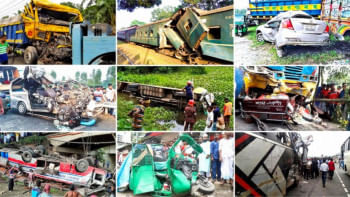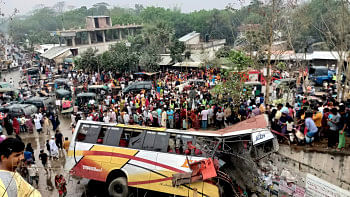Road safety barely an afterthought

Due to the government's involvement in the ownership and operation of transportation, the transportation sector in Bangladesh is plagued by irregularities, lawlessness, unreasonable fares, and passenger distress. Since passengers usually lack a means of direct communication with the government, they often become victims of various forms of exploitation, leaving millions of ordinary commuters helpless. Essentially, the collaboration between the government, transport owners, and transport workers has left the country's passengers vulnerable.
Despite the government's efforts, there is a widespread lack of discipline and lawlessness in our transport sector. Concerned citizens' groups, after demanding changes in the sector for many years, finally united to rally for safer roads after one tragic accident on July 29, 2018, when two students of Shaheed Ramiz Uddin Cantonment College were killed by a bus in the capital's Kurmitola area. Subsequently, and hurriedly, the government passed a new law. However, nearly five years after its introduction, the Road Transport Act, 2018 has largely failed to address the concerns of ordinary commuters.
The Passenger Welfare Association of Bangladesh believes that this law does not differ significantly from its predecessor. Therefore, on this year's Passenger Rights Day, we should emphasise the demand for passenger rights within the Road Transport Act, 2018.
Though geographically minuscule, Bangladesh is home to a population of over 180 million people and is developing rapidly. Despite substantial investment in transport infrastructure, the government has struggled to create a reliable public transport system, particularly in Dhaka. Over the past few decades, public transportation has lagged behind, resulting in uncomfortable, overcrowded buses and an unreliable system. While the rest of the world has advanced in terms of communication, culture, business, and social development, Bangladesh's public transportation system remains subpar. Even as our road and transport infrastructure have developed for the better over the past decade or so, we have also seen a dire lack of safety and regulations on our roads.
Meanwhile, the lack of government foresight, dynamic leadership, and efficient transportation planning has allowed powerful transport sector syndicates to exploit the system, leading to rampant corruption and countless issues in the sector. Private investors are reluctant to enter this sector, which has led to an influx of individual and small-scale vehicle operators, such as motorcycles, rickshaws, and private cars. This overcrowding has exacerbated the risk of accidents on our roads. Moreover, due to the misuse of traffic laws, uncontrolled traffic movements, and the unchecked power of transport owners, there is a growing sense of insecurity among passengers. Every day, numerous people fall victim to road crashes, and the rights of commuters are violated without anyone facing due accountability.
The government sets bus fares based on prescription, but international consumer rights laws stipulate that a committee should be formed with a proportional number of consumers (in this case, passengers) to determine bus fares. However, despite the provision for passenger representation, the Road Transport Act allows transport company owners and the government to jointly set fares, which can sometimes lead to arbitrary fare hikes. As a result, commuters, who make up the majority of Bangladesh's population, are demanding a provision in the law that will ensure passenger representation on the fare determination committee.
It is essential to include provisions such as route permits based on the route, economic life determination, bus stop determinations, extra fare monitoring committees, a road accident victim support fund, road transport laws and regulations preparation and amendments, and the inclusion of passenger representatives in all committees dedicated to improving the convenience and facilities for ordinary passengers in the Road Transport Act, 2018 and the Road Transport Rules, 2022.
Md Mozammel Haque Chowdhury is secretary-general of Bangladesh Passenger Welfare Association.

 For all latest news, follow The Daily Star's Google News channel.
For all latest news, follow The Daily Star's Google News channel. 










Comments